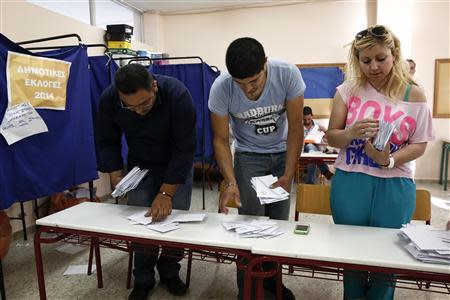Greece's leftist Syriza party fares well in key local races
By Renee Maltezou and Deepa Babington ATHENS (Reuters) - Greece's leftist Syriza party performed strongly in key races in the first round of local elections on Sunday, as voters poured out their anger at the government's austerity policies. The vote, along with European Parliament elections a week later, is being closely watched as a gauge of sentiment towards the coalition of Prime Minister Antonis Samaras, which came to power two years ago and holds just a two-seat majority in parliament. Official projections showed Syriza making the run-off in the race for mayor of symbolically important Athens. It also led in the wider Attica region, which includes just under a third of Greece's population. "There is a new trend in favor of anti-establishment parties," political analyst John Loulis said. "... Although people don't trust Syriza yet, they are willing to experiment." Syriza's candidate for Athens, 33-year-old economist Gabriel Sakellaridis, was less than 1 percentage point behind the incumbent, leftist-backed George Kaminis, with 21 percent of the vote, according to the official projection by Singular Logic. Syriza's Rena Dourou was set to win the first-round race for prefect - similar to state governor - in Attica, with nearly 24 percent of the vote. If either Syriza candidate wins the run-off next week, it would be the first time a far-left party has won either post, which have been bastions of support for Samaras's New Democracy party and his Socialist coalition partner PASOK. Samaras's New Democracy appeared to gain in other regions previously controlled by its coalition partner PASOK, which looked set to retain the lead in only two regions, compared with the eight it controls now, according to early results. Samaras said the results were "positive" for New Democracy and urged Greeks to vote for "stability" next week. "The following Sunday we have the battle of the EU elections. A battle where Greece needs to show that it has the stability it deserves and won with sacrifices", he said. "It's up to Greeks, either to contribute with their vote to ensure that Greek people feel the certainty that we will move ahead steadily, or let the country slide back." Independents led in two other key mayoral races: in Greece's second city, Thessaloniki, where leftist-backed incumbent Yannis Boutaris took over 35 percent of the vote, and in the port town of Piraeus, where a candidate backed by a prominent ship-owner was set to win the first round. "GET OUT!" Elections were held for mayors and town councils in 325 municipalities as well as prefects for 13 regions across Greece, with a run-off vote to be held on May 25. Nearly 10 million Greeks were eligible to vote. After six years of recession and waves of austerity measures that have shrunk incomes and pushed unemployment over 26 percent, the election is being fought as much on national issues as on local ones. The far-right Golden Dawn party failed to make the run-off for the Athens mayor race, but its candidate Ilias Kasidiaris - who shot to fame after slapping a female lawmaker on television in 2012 - was still set to take 16 percent of the vote. The party remains Greece's third or fourth most popular, despite a judicial crackdown that has left its leader and top lawmakers in jail pending trial. Much of its appeal comes from its fiercely anti-immigrant rhetoric - it has campaigned to padlock a playground in central Athens to keep immigrants out. "I'll vote for Golden Dawn or Syriza. Why vote for those who have robbed us?" said 45-year-old Vaso Stathakou, a mother of two. "It's not a matter of ideology, I don't give a damn about their politics. My message is clear and I'll use every opportunity to send it: Get out!" "SURROUNDED BY UNCERTAINTY" A poll by Kapa conducted on Sunday also showed the momentum swinging towards Syriza for the more important EU vote. The survey showed it winning over New Democracy by nearly 5 points. Syriza's leader Alexis Tsipras, who is also running to head the European Commission, called on Greeks to send a strong message against austerity in the May 25 vote. "Today citizens made a first step. The following Sunday could become the first day of a new era. Our country will send a strong message to Europe and the world," Tsipras said. "The message is: "Greece does not belong to any one else except its people." After falling in recent months, Greek bond yields have crept up again on fears more political instability could cut off a feeble economic recovery now under way. "To asset managers looking at Greece, the vote is an event surrounded by uncertainty, hence the volatility," said Theodore Krintas, head of wealth management at Attica Bank, referring to the outcome of the EU election later this month. "The uncertainty is due to the fact that the vote has been played up domestically as crucial to stability. Markets will reassess the situation after the vote." ($1 = 0.7297 Euros) (Additional reporting by Angeliki Koutantou, writing by Deepa Babington; Editing by Larry King and Eric Walsh)


